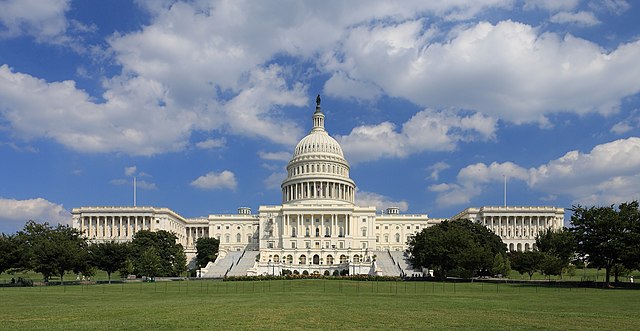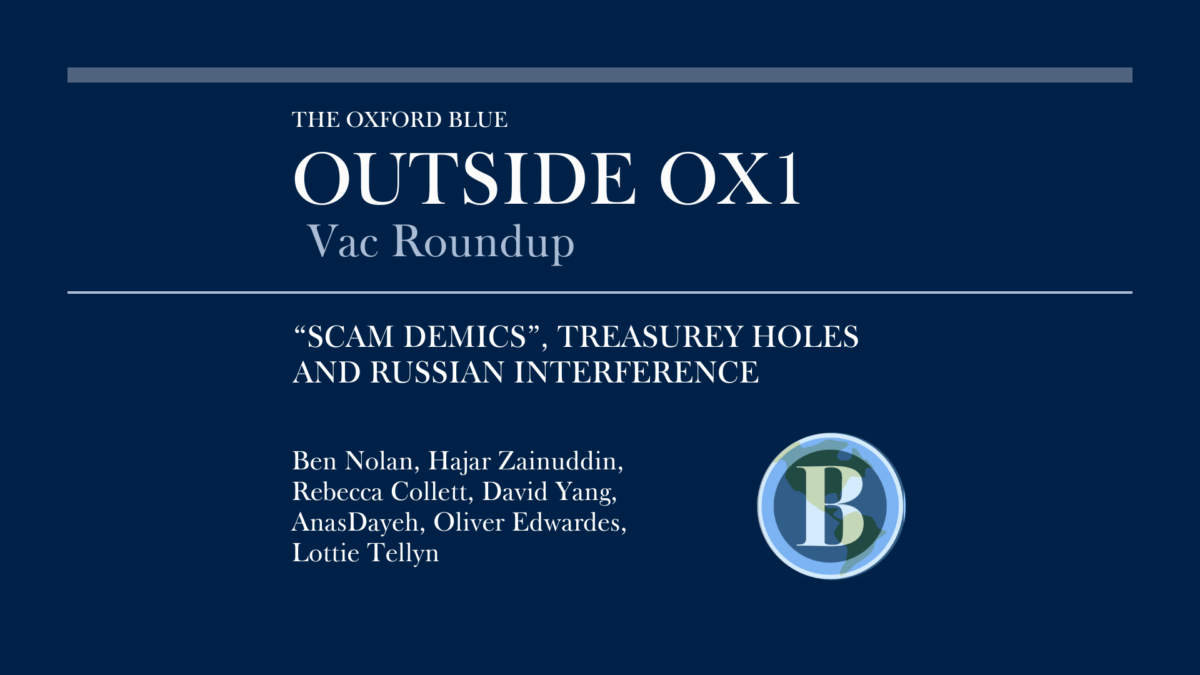A note from the editor
Welcome to the newly refurbished OX1 column!
A lot can happen during a vacation. A potential government shutdown in the US, investigations into ‘cyber slavery, a vote on indigenous rights and representation.
This weekly series will aim to deliver the news you may have missed whilst lost in the Gladstone Link.
With contributions from other sections of the Blue and Oxford societies we aim to allow your mind to wander outside OX1, to show that the news consists of stories larger than the scandalous rise in crew date prices.
Asia’s “scam-demic”: Hundreds of thousands fall prey on both sides
Hajar Zainuddin
Online scamming has been a major issue in Asia for many years, run largely by transnational criminal organisations across mainland China, Taiwan and Hong Kong. However, the online shift brought by COVID-19 expanded the reach and ability of scam syndicates, supercharging the phenomenon into a “scam-demic”.
A UN report released on 29 August estimates that these scam hubs generate billions of USD in revenue per year. In Singapore alone, 245.7 million USD was lost to scams in the first half of 2023. Scammers are growing increasingly sophisticated, and have begun targeting people across the entire socioeconomic spectrum – including professionals and postgraduate degree-holders.
On the other side lies the shocking reality of “cyber-slavery”: a dangerous symbiosis between scam operations and human trafficking. The UN report reveals that hundreds of thousands of people from around the world have been trafficked to Southeast Asia to run online scams, including at least 120,000 people in Myanmar and another 100,000 in Cambodia.
Educated and computer-literate victims are lured in by bogus online job ads and end up in loosely regulated border regions or special economic zones in Southeast Asia. They are then held against their will and forced to work long hours running online frauds. Those who do not comply are often threatened with various forms of violence; a tragic case last year saw a 25-year-old Malaysian man beaten to death at the hands of scam traffickers.
Cracking down on these syndicates can be difficult, as scam operations continually relocate to evade the reach of local police. However, regional leaders are recognising the necessity of multilateral cooperation, and China and the ASEAN nations have vowed to work together to tighten law enforcement and fight scam syndicates in border zones.

US narrowly avoids government shutdown
Becky Collett
Many US federal government agencies depend upon annual funding approved by Congress in order to function. Agencies submit their requests to Congress every year, but because Republicans control the House of Representatives by a small majority and Democrats hold the Senate by a single seat, budgets must be agreed by both parties in order to advance through both chambers to President Biden. However the deadline for Congress to agree on a new budget is the 1st of October – the start of the fiscal year. If an agreement were not reached by then, the government would shut down, in which all non-essential discretionary functions would cease.
Such an agreement looked increasingly unlikely over the past few days due to deep ideological divisions among the Republican majority in the House of Representatives. A right-wing faction in the House was demanding severe cuts including ceasing military funding for Ukraine, a demand which also received vocal support online from ex-President Donald Trump.
Nonetheless, with just hours to spare before the government was due to shut down, the House of Representatives agreed to a short-term funding deal 335 votes to 91. Though the move to go forward with a short-term funding deal was a blow to the small right-wing faction in the House who had held up negotiations with demands for extreme spending cuts, one of their key demands – to cease funding Ukraine’s defence against its invasion by Russia – made it into the bill. In what may prove to be detrimental for House Speaker Kevin McCarthy, the bill passed with more Democratic support than Republican. The bill was then quickly passed by the Senate with only 9 Republicans rejecting it, before it was signed by Biden, therefore narrowly avoiding shutdown. However, the short-term bill only continues current levels of funding for 45 days, when these disagreements will be revitalised once more.
Australian mood towards indigenous “Voice” sours
David Yang
Next week, Australian voters will be asked whether to add a “Voice to Parliament” for indigenous Australians, or “First Nations” people, to their constitution. If the October 14 referendum passes, Australia will formally recognise the native Aboriginal peoples and Torres Strait Islanders in the country’s constitution for the first time, as well as create a federal advisory body to relay their views on policy affecting them to the government. Unlike neighbouring New Zealand, which in 1840 formally recognised and granted rights to the native Maori in its founding document, Australia’s constitution has no formal recognition of or treaty with the indigenous population.
Proponents of the “Yes” camp in favour of creating the “Voice”, including the Greens and Prime Minister Anthony Albanese’s Labor party, argue that doing so would grant the long underrepresented and abused First Nations people recognition and a platform to voice their concerns to the government in areas of policy affecting them, such as health, criminal justice, and education. Indigenous Australians have historically endured abuse and mistreatment from the Australian government, facing forced abductions of Aboriginal children and placement into boarding schools for assimilation. Even today, indigenous populations suffer from poorer health, lower levels of education, and higher rates of poverty and crime than the rest of the country. By creating an advisory body to the government, though one without any actual veto or legislative power, the “Voice” would help craft policy to ensure indigenous communities are not left behind.
However, those in the “No” camp, including the conservative Liberal-National coalition opposition, have argued that the “Voice” will “divide [the country] by race”, while others accuse it of not going far enough in repairing the damage to First Nations people. Despite an early lead for the “Yes” campaign, these views may be taking hold as current polling shows the “No” vote with a majority.
Growth, Earthquakes and Reconciliation in the Middle East
Anas Dayeh
The Middle East observed notable geopolitical shifts and economic trends. The Gulf Cooperation Council (GCC) countries are forecasted to see a 2.5% GDP growth in 2023 and 3.2% in 2024. This compares to the region’s remarkable GDP growth of 7.3% in 2022. Diplomatic relations witnessed a thaw with a U.S.-Iranian prisoner swap with $6 billion of Iranian assets unfrozen, and discussions on a Saudi-Israeli normalisation agreement advanced significantly, highlighted by speeches and interviews during the United Nations General Assembly week. Yemen saw progress in peace talks focusing on humanitarian and rebuilding efforts. Egypt faces a deepening economic crisis, threatening further socio-economic hardships. New regional initiatives like the India-Middle East-Europe Economic Corridor (IMEC) emerged at the G20 summit. COP28, scheduled for November in the UAE, will emphasise the need for large-scale climate finance. Israel underwent a political crisis with a judiciary reform bill and launched the largest military operation since the end of the Second Intifada in Jenin amid a rise in regional tensions. Protests across several Middle Eastern nations erupted following Quran burnings. A devastating earthquake in southern Morocco and catastrophic floods in Libya. Lastly, a significant diplomatic breakthrough occurred as Saudi Arabia and Iran restored diplomatic relations, marking a step towards regional amiability.
The Big Jackson Hole in US Treasury’s Balance Sheet
Oliver Edwardes
All eyes from the global financial system focussed on a holiday resort in the US state of Wyoming over the summer, as the world’s central bankers gathered for what is normally the excessively dull Jackson Hole Economic Symposium. There was a twist this year, however, with the presentation of two alarming papers on US government debt. It’s no secret that the US has got a lot of debt right now and Barry Eichengreen’s paper Living with high public debt reveals that there is currently no way to stop this debt ballooning. Eichengreen states that – with interest rates so high – there is no foreseeable way for the US to grow out of its debt, as US GDP will not exceed interest rates for the next 10 years. He also notes that there is no political consensus for reducing debt, and that there is an appetite among politicians for even more spending or tax cuts.
The second is a paper by Darrell Duffie on how the market for buying and selling US government debt can no longer cope with the volume of trades that occur. Duffie explains that the current regulatory framework means that all trading in US debt goes through a few prestigious banks; these banks have been subject to stricter regulation since the financial crisis and the amount of US debt has grown so much that in times of high stress they cannot cope, which leaves groups (such as pension funds) unable to sell their traditionally safe US bonds when they need the money. Duffie explores different options for fixing this problem, but none of them are pain free.
Ultimately, these papers left a sour aftertaste from the conference, as they may complicate the effects of further interest rate rises. US debt is meant to be the safest asset you can possibly own, and as it looks increasingly precarious, investors and policymakers are rightfully worried.

Environment – Sunak’s Green rollback
Lottie Tellyn
In the UK, Sunak’s green rollback may swing Tory voters…
A poll carried out by Opinium last month has shown that Sunak’s repealing of key climate goals, such as pushing back the ban on new petrol and diesel cars to 2035, may drive Tory voters to change their vote in the next election.
The poll suggests that over a third of the 2019 voters who were surveyed plan to vote for a different party in the next general election, which is due by January 2025 at the latest.
This is potentially good news on two counts: first, it shows that voters continue to prioritise the climate when making voter decisions; second, it could push the major parties to further prioritise their climate agendas in the next election.
Stubbs Society – Russian interference in elections poses ongoing threat to Western democracy
Becky Collett
In 2021 the government’s first national security advisor, Lord Ricketts, was part of a coalition of MPs and peers from a host of different parties that used the European court of human rights to challenge the government’s alleged failure to investigate Russian interference in UK elections. This move followed the publication of the Russia report in July 2020 by parliament’s intelligence and security committee (ISC). This report found “credible evidence” that the UK was a target for “political influence operations” and “disinformation campaigns” carried out by Vladimir Putin’s operatives. Nonetheless, prime minister at the time Boris Johnson, refused to release the Russia report before 2019’s general election.
The ISC urged Downing Street to carry out a full inquiry into Kremlin meddling and to put in place a legislative framework to prevent future interference by foreign states however No.10 turned down this request arguing that there was no evidence of successful disruption by Moscow. Lord Ricketts and other parliamentarians thus sought out a judicial review; they argued that the government’s inaction breached its obligation under article three, protocol one of the European convention on human rights which requires genuinely free elections to take place. The high court claim named former prime minister Boris Johnson as a defendant.
Lord Strasburger, a British Liberal Democrat politician described Lord Rickett’s support for this action as “very significant” citing Ricketts as “about as senior as it gets in the intelligence community”, saying “if he is worried about the government’s refusal to investigate, we all should be”. Ultimately, however, the judge – Mr Justice Swift – turned down the cross-party group’s application for a judicial review.
Labour’s Ben Bradshaw, one of the cross-party group said concerning this decision: “This leaves our democracy defenceless against a hostile foreign power,” and “there is a timidity on the part of the legal establishment to stand up to the executive.” Given the upcoming presidential election in the USA in 2024 and our own general election likely to take place in 2025, Russian interference poses an ongoing threat to democracies across the West.
However, there will be a rare opportunity to meet someone involved in security work to prevent the ongoing threat from Russia within Oxford. The Stubbs Society for Foreign Affairs and Defence will be hosting Lord Ricketts for a lunchtime talk in Oriel College from 1-2pm on Wednesday 18th October (week 2), where he will be giving a talk on ‘The War in Ukraine and the Prospects for European Security’.
Coincidentally the Stubbs Society will also be hosting, in collaboration with the Oxford Media Society, the journalist who wrote the Guardian article on this legal case – Luke Harding. This talk will be held at University College at 5pm, and both events are free for everyone to attend.
Write for us!
Interested in writing for the OX1 column, looking for somewhere to turn your article idea into a reality? Then look no further. Both the Global Affairs and Environment Section are looking for new writers and contributors. If you’re interested in student journalism and want to get involved make sure to join the Oxford Blue writers group on Facebook.
Oxford Blue Writers Group:
https://www.facebook.com/groups/2462003647260904/?mibextid=oMANbw
Global Affairs Writers Group:
https://www.facebook.com/groups/441255647575456/?mibextid=oMANbw


Comments are closed.